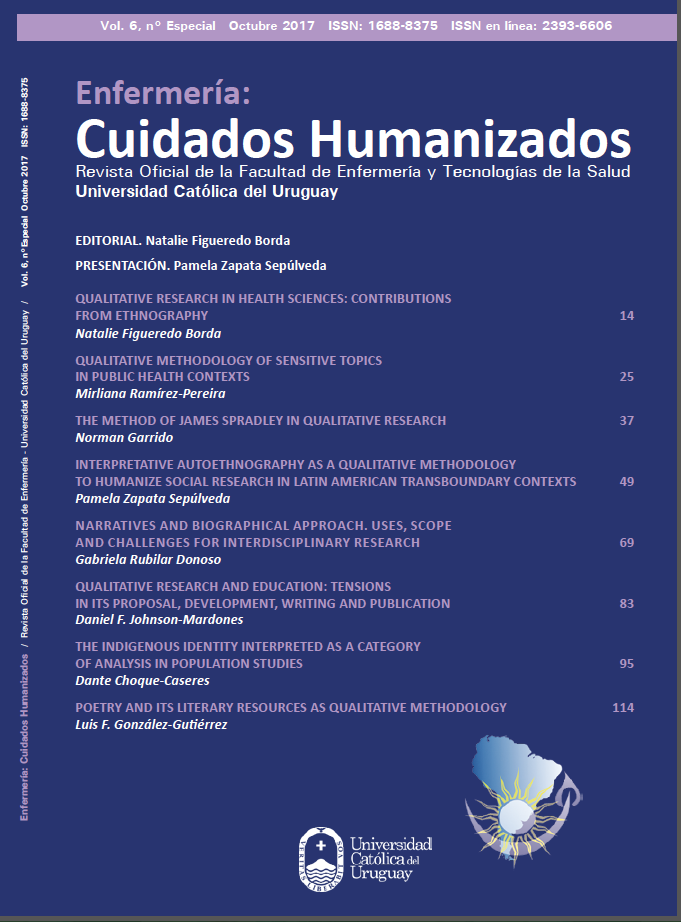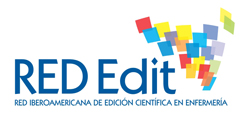INVESTIGACIÓN CUALITATIVA Y EDUCACIÓN.TENSIONES EN SU PROPUESTA, DESARROLLO, ESCRITURA Y PUBLICACIÓN
DOI:
https://doi.org/10.22235/ech.v6iEspecial.1455Palabras clave:
Investigación Cualitativa, Análisis Cualitativo, Escritura Cualitativa, Educación IntegralResumen
El presente trabajo explora las tensiones en investigación cualitativa y educación. Con ese objetivo, el texto parte ofreciendo una breve introducción a la investigación cualitativa en educación, una visión del vínculo histórico de estos dos campos de estudio, para desembocar en una reflexión entre lo temático y lo metodológico cuando hablamos de investigación cualitativa en/y educación. Sobre esta base, el escrito pasa a centrarse en las tensiones que aparecen en la formulación de una propuesta, desarrollo, escritura y publicación de una investigación cualitativa en educación. Las tensiones en la propuesta se concentran en los formatos de formulación y presentación de proyectos de investigación cuando construimos el objeto de estudio desde la perspectiva cualitativa. En el desarrollo de la investigación, el tiempo aparece como una preocupación central desde diversos puntos de vista, así como la tensión entre el orden del análisis y el orden de la presentación. La escritura es abordada desde la tensión entre la opción por un texto argumentativo y un texto narrativo. Por último, las tensiones en la publicación se centran en el envío de manuscritos a revistas temáticas o revistas especializadas en metodología. Las tensiones en cada uno de estos momentos de la investigación cualitativa en educación son exploradas desde el punto de vista de las posibilidades.
Descargas
Citas
Given L. The SAGE Encyclopedia of Qualitative Research Methods. 1ª ed. Thousand Oaks: SAGE; 2008.
Jupp V. The SAGE Dictionary of Social Research Methods. 1ª ed. Thousand Oaks: SAGE; 2006.
Bolivar A. “De nobis ipse silemus?”: Epistemology of Biographical-Narrative Research in Education. Revista Electrónica de Investigación Educativa. 2002; 4 (1): 1-24
Clandinin DJ, Connelly M. Narrative inquiry: experience and story in qualitative research. 1ª ed. San Francisco: Jossey-Bass; 2000.
Chase SE. Narrative inquiry: Still a field in the making. En Denzin NK, Lincoln YS, editors. The Sage handbook of qualitative research. Thousand Oaks: SAGE; 2011 p. 421-434.
Clandinin DJ. Handbook of narrative inquiry: Mapping a methodology. 1ª ed. Thousand Oaks: SAGE; 2007.
Craig, CJ. Research on the boundaries: Narrative inquiry in the midst of organized school reform. Journal of Educational Research. 2009; 103 (2): 123-136.
Chang H. Autoethnography as Method. 1ª ed. New York: Routledge; 2009.
Denzin NK. Interpretive autoethnography. 1ª ed. Thousand Oaks: Sage; 2013.
Denzin NK. Interpretive autoethnography. En Holman S, Linn L, Ellis C, editores. Handbook of autoethnography. New York: Left Cost Press; 2013, p. 123-142.
Denzin NK. Interpretive biography. 1ª ed. Newbury Park: SAGE; 1989.
Ellis C. Revision. Autoethnographic reflections on life and work. 1ª ed. Walnut Creek: Left Coast Press; 2009.
Ellis C. The ethnographic I. A methodological novel about autoethnography. 1ª ed. Walnut Creek: Altamira Press; 2004.
Ellis C, Bochner A. Autoethnography, personal narratives, reflexivity: Researcher as subject. En Denzin NK, Lincoln YS, editors. The Sage handbook of qualitative research. Thousand Oaks: SAGE; 2000 p. 733-768.
Noffke S. Revisiting the professional, personal, and political dimensions of action research. En Noffke S, Somekh B, editors. The SAGE handbook of educational action research. Washington: SAGE; 2009, pp. 5–18.
Freire P. Pedagogy of the oppressed. 1ª ed. New York: Continuum. 1971.
Schwandt T. Dictionary of Qualitative Inquiry. 4ª ed. Thousand Oaks: SAGE; 2015.
Richards L, Morse J. Read me first: For a user's guide to qualitative methods. 4ª ed. Thousand Oaks: SAGE; 2013.
Rodríguez L. El modelo argumentativo de Toulmin en la escritura de artículos de investigación educativa. Revista Digital Universitaria. 2004; 5 (1): 1-18.
Bruner J. Actual minds, possible world. 1ª ed. Cambridge: Harvard University Press; 1986
(22) Richardson L, St. Pierre EA. Writing: A method of inquiry. En Denzin NK, Lincoln YS, editors. The Sage handbook of qualitative research. Thousand Oaks, CA: SAGE; 2005, p. 959-978.
(23) Denzin NK, Lincoln YS, editores. 3ª ed. The SAGE handbook of qualitative research. Thousand Oaks: SAGE; 2005.
(24) St. Pierre EA. Post qualitative research: The critique and the coming after. En Denzin NK, Lincoln YS, editors. The Sage handbook of qualitative research. Thousand Oaks, CA: SAGE; 2011, p. 611-625.
Descargas
Publicado
Cómo citar
Número
Sección
Licencia
Derechos de autor 2017 Enfermería: Cuidados Humanizados

Esta obra está bajo una licencia internacional Creative Commons Atribución 4.0.

















